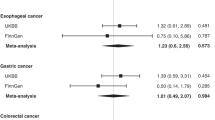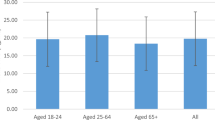Abstract
Background/Objectives:
Vegans, and to a lesser extent vegetarians, have low average circulating concentrations of vitamin B12; however, the relation between factors such as age or time on these diets and vitamin B12 concentrations is not clear. The objectives of this study were to investigate differences in serum vitamin B12 and folate concentrations between omnivores, vegetarians and vegans and to ascertain whether vitamin B12 concentrations differed by age and time on the diet.
Subjects/Methods:
A cross-sectional analysis involving 689 men (226 omnivores, 231 vegetarians and 232 vegans) from the European Prospective Investigation into Cancer and Nutrition Oxford cohort.
Results:
Mean serum vitamin B12 was highest among omnivores (281, 95% CI: 270–292 pmol/l), intermediate among vegetarians (182, 95% CI: 175–189 pmol/l) and lowest among vegans (122, 95% CI: 117–127 pmol/l). In all, 52% of vegans, 7% of vegetarians and one omnivore were classified as vitamin B12 deficient (defined as serum vitamin B12 <118 pmol/l). There was no significant association between age or duration of adherence to a vegetarian or a vegan diet and serum vitamin B12. In contrast, folate concentrations were highest among vegans, intermediate among vegetarians and lowest among omnivores, but only two men (both omnivores) were categorized as folate deficient (defined as serum folate <6.3 nmol/l).
Conclusion:
Vegans have lower vitamin B12 concentrations, but higher folate concentrations, than vegetarians and omnivores. Half of the vegans were categorized as vitamin B12 deficient and would be expected to have a higher risk of developing clinical symptoms related to vitamin B12 deficiency.
This is a preview of subscription content, access via your institution
Access options
Subscribe to this journal
Receive 12 print issues and online access
$259.00 per year
only $21.58 per issue
Buy this article
- Purchase on Springer Link
- Instant access to full article PDF
Prices may be subject to local taxes which are calculated during checkout

Similar content being viewed by others
References
Baik HW, Russell RM (1999). Vitamin B12 deficiency in the elderly. Annu Rev Nutr 19, 357–377.
Bingham SA, Cassidy A, Cole TJ, Welch A, Runswick SA, Black AE et al. (1995). Validation of weighed records and other methods of dietary assessment using the 24 h urine nitrogen technique and other biological markers. Br J Nutr 73, 531–550.
Bingham SA, Gill C, Welch A, Day K, Cassidy A, Khaw KT et al. (1994). Comparison of dietary assessment methods in nutritional epidemiology: Weighed records v. 24 h recalls, food-frequency questionnaires and estimated-diet records. Br J Nutr 72, 619–643.
Brocadello F, Levedianos G, Piccione F, Manara R, Francini Pesenti F (2007). Irreversible subacute sclerotic combined degeneration of the spinal cord in a vegan subject. Nutrition 23, 622–624.
Clarke R, Sherliker P, Hin H, Nexo E, Hvas AM, Schneede J et al. (2007). Detection of vitamin B12 deficiency in older people by measuring vitamin B12 or the active fraction of vitamin B12, holotranscobalamin. Clin Chem 53, 963–970.
Crane MG, Sample C, Patchett S, Register UD (1994). Vitamin B12 Studies in Total Vegetarians (Vegans). J Nutr Environ Med 4, 419.
Davey GK, Spencer EA, Appleby PN, Allen NE, Knox KH, Key TJ (2003). EPIC-Oxford: Lifestyle characteristics and nutrient intakes in a cohort of 33 883 meat-eaters and 31 546 non meat-eaters in the UK. Public Health Nutr 6, 259–268.
Den Elzen WPJ, Westendorp RGJ, Frölich M, De Ruijter W, Assendelft WJJ, Gussekloo J (2008). Vitamin B12 and folate and the risk of anemia in old age: The Leiden 85-plus study. Arch Intern Med 168, 2238–2244.
Draper A, Lewis J, Malhotra N, Wheeler E (1993). The energy and nutrient intakes of different types of vegetarian: A case for supplements. Br J Nutr 69, 3–19.
Gibson RS (2005). Principles of Nutritional Assessment. 2nd ed. Oxford University Press Inc: New York.
Green TJ, Venn BJ, Skeaff CM, Williams SM (2005). Serum vitamin B12 concentrations and atrophic gastritis in older New Zealanders. Eur J Clin Nutr 59, 205–210.
Haddad EH, Berk LS, Kettering JD, Hubbard RW, Peters WR (1999). Dietary intake and biochemical, hematologic, and immune status of vegans compared with nonvegetarians. Am J Clin Nutr 70, 586S–593S.
Herbert V (1994). Staging vitamin B-12 (cobalamin) status in vegetarians. Am J Clin Nutr 59, 1213S–1222S.
Herrmann W, Schorr H, Obeid R, Geisel J (2003). Vitamin B-12 status, particularly holotranscobalamin II and methylmalonic acid concentrations, and hyperhomocysteinemia in vegetarians. Am J Clin Nutr 78, 131–136.
Herrmann W, Schorr H, Purschwitz K, Rassoul F, Richter V (2001). Total homocysteine, vitamin B12, and total antioxidant status in vegetarians. Clin Chem 47, 1094–1101.
Hokin BD, Butler T (1999). Cyanocobalamin (vitamin B-12) status in Seventh-day Adventist ministers in Australia. Am J Clin Nutr 70, 576S–578S.
Hung C, Huang P, Lu S, Li Y, Huang H, Lin B et al. (2002). Plasma homocysteine levels in Taiwanese vegetarians are higher than those of omnivores. J Nutr 132, 152–158.
Hvas A, Nexo E (2005). Holotranscobalamin—A first choice assay for diagnosing early vitamin B12 deficiency? J Intern Med 257, 289–298.
Key TJ, Appleby PN, Spencer EA, Travis RC, Roddam AW, Allen NE (2009). Mortality in British vegetarians: results from the European Prospective Investigation into Cancer and Nutrition (EPIC-Oxford). Am J Clin Nutr 89, 1613S–11619S.
Key TJ, Fraser GE, Thorogood M, Appleby PN, Beral V, Reeves G et al. (1999). Mortality in vegetarians and nonvegetarians: Detailed findings from a collaborative analysis of 5 prospective studies. Am J Clin Nutr 70 (3 Suppl), 516S–524S.
Koebnick C, Hoffmann I, Dagnelie PC, Heins UA, Wickramasinghe SN, Ratnayaka ID et al. (2004). Long-term ovo-lacto vegetarian diet impairs vitamin B-12 status in pregnant women. J Nutr 134, 3319–3326.
Krajčovičová-Kudláčková M, Blažíček P, Kopčová J, Béderová A, Babinská K (2000). Homocysteine levels in vegetarians versus omnivores. Ann Nutr Metab 44, 135–138.
Lindenbaum J, Rosenberg IH, Wilson PWF, Stabler SP, Allen RH, Allen LH et al. (1994). Prevalence of cobalamin deficiency in the Framingham elderly population. Am J Clin Nutr 60, 2–14.
Lloyd-Wright Z, Hvas A, Møller J, Sanders TAB, Nexø E (2003). Holotranscobalamin as an Indicator of Dietary Vitamin B12 Deficiency. Clin Chem 49, 2076–2078.
Loikas S, Koskinen P, Irjala K, Löppönen M, Isoaho R, Kivelä SL et al. (2007). Vitamin B12 deficiency in the aged: A population-based study. Age Ageing 36, 177–183.
Majchrzak D, Singer I, Manner M, Rust P, Genser D, Wagner K et al. (2006). B-Vitamin Status and Concentrations of Homocysteine in Austrian Omnivores, Vegetarians and Vegans. Ann Nutr Metab 50, 485.
Mann NJ, Li D, Sinclair AJ, Dudman NPB, Guo XW, Elsworth GR et al. (1999). The effect of diet on plasma homocysteine concentrations in healthy male subjects. Eur J Clin Nutr 53, 895–899.
Nilsson-Ehle H, Jagenburg R, Landahl S, Lindstedt S, Svanborg A, Westin J (1991). Serum cobalamins in the elderly: A longitudinal study of a representative population sample from age 70 to 81. Eur J Haematol 47, 10–16.
Obeid R, Geisel J, Schorr H, Hübner U, Herrmann W (2002). The impact of vegetarianism on some haematological parameters. Eur J Haematol 69, 275–279.
Rauma A, Torronen R, Hanninen O, Mykkanen H (1995). Vitamin B-12 status of long-term adherents of a strict uncooked vegan diet (‘living food diet’) is compromised. J Nutr 125, 2511–2515.
Ruston D, Hoare J, Henderson L, Gregory J, Bates CJ, Prentice A et al. (2004). The National Diet & Nutrition Survey: adults aged 19 to 64 years. Nutritional Status (Anthropometry and Blood Analytes), Blood Pressure and Physical Activity. TSO: London.
Takahashi H, Ito S, Hirano S, Mori M, Suganuma Y, Hattori T (2006). Subacute combined degeneration of the spinal cord in vegetarians: Vegetarian's myelopathy. Intern Med 45, 705–706.
Wahlin A, Bäckman L, Hultdin J, Adolfsson R, Nilsson LG (2002). Reference values for serum levels of vitamin B12 and folic acid in a population-based sample of adults between 35 and 80 years of age. Public Health Nutr 5, 505–511.
Waldmann A, Koschizke JW, Leitzmann C, Hahn A (2004). Homocysteine and cobalamin status in German vegans. Public Health Nutr 7, 467–472.
Watanabe F (2007). Vitamin B12 sources and bioavailability. Exp Biol Med 232, 1266–1274.
Acknowledgements
We thank all the participants in the EPIC-Oxford cohort for their invaluable contribution to the study, as well as the laboratory staff at King's College London, UK, for the measurement of serum vitamin B12 and folate concentrations. This study was conducted during tenure of a Girdlers’ New Zealand Health Research Council Fellowship (FLC) and we further acknowledge the Dutch Cancer Society (AMJG). The study was funded by Cancer Research UK; Medical Research Council, UK; and the European Commission.
Author information
Authors and Affiliations
Corresponding author
Ethics declarations
Competing interests
TJK is a member of the Vegan Society, UK. The other authors declare no conflict of interest, financial or otherwise.
Rights and permissions
About this article
Cite this article
Gilsing, A., Crowe, F., Lloyd-Wright, Z. et al. Serum concentrations of vitamin B12 and folate in British male omnivores, vegetarians and vegans: results from a cross-sectional analysis of the EPIC-Oxford cohort study. Eur J Clin Nutr 64, 933–939 (2010). https://doi.org/10.1038/ejcn.2010.142
Received:
Revised:
Accepted:
Published:
Issue Date:
DOI: https://doi.org/10.1038/ejcn.2010.142
Keywords
This article is cited by
-
Evaluation of antioxidant activity and fermentation properties of potential probiotic strain Lactiplantibacillus plantarum HY7720 in plant-based materials
Discover Applied Sciences (2024)
-
Replacing dietary animal-source proteins with plant-source proteins changes dietary intake and status of vitamins and minerals in healthy adults: a 12-week randomized controlled trial
European Journal of Nutrition (2022)
-
Association of dietary intakes of vitamin B12, vitamin B6, folate, and methionine with the risk of esophageal cancer: the Japan Public Health Center-based (JPHC) prospective study
BMC Cancer (2021)
-
The impact of a vegan diet on pregnancy outcomes
Journal of Perinatology (2021)
-
High-Protein Plant-Based Diet Versus a Protein-Matched Omnivorous Diet to Support Resistance Training Adaptations: A Comparison Between Habitual Vegans and Omnivores
Sports Medicine (2021)



